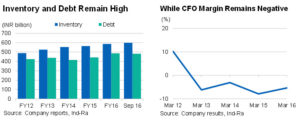The Indian real estate market is currently grappling with a double whammy, one from the cash shortage caused by the impact of demonetisation and the second by the imminent introduction of the Real Estate Regulator (RERA). This, along with the increasing refinancing risk, would shake-up the sector, with developers with high leverage losing out.

Come July 1 and leasing of land, renting of buildings as well as EMIs paid for purchase of under-construction houses will start attracting the Goods and Services Tax. Sale of land and buildings will be however out of the purview of GST, the new indirect tax regime.The Central GST (CGST) bill — one of the four legislations introduced, states that any lease, tenancy, easement, licence to occupy land will be considered as supply of service. Also, any lease or letting out of the building, including a commercial, industrial or residential complex for business or commerce, either wholly or partly, is a supply of services as per the CGST bill. This will further lead to delayed decision making on the part of buyer and add to real estate develops woes.
I think like many other sector this sector is also on the verge of shakeup .Real estate will also have only few winners as debt hangover will lead to emergence of regional and national oligopolies .Private investor (institutional investors) with deep pocket and easy access to cheap funding will be the new landowners of India.
What real Estate companies are low and investable sir?
Hi Sanjay i am not into advisory business so i cannot comment on this
Hi sir,
Really enjoy reading your articles. I do have a basic doubt that you could help me with. I thought with falling interest rates, refinancing would become easier? Thanks a lot
RBI cutting rates should lead to lower refinancing rates but if commercial banks dont pass on the rate cuts then it has no meaning and that is ehy RBI and govt keeps on prodding these banks to pass on the benefit of rate cuts to borrowers